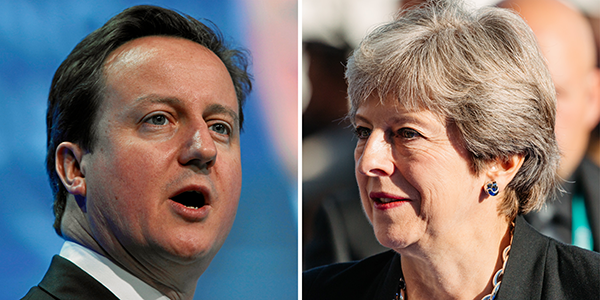A tale of two failures: poor choices and bad judgements on the road to Brexit
How did we get where we are on Brexit? Many political events are shaped by institutions and long-term social changes, but the political choices of leaders matter too. Ben Worthy assesses how the short-term decisions of David Cameron and Theresa May have led to this avoidable Brexit mess.

David Cameron. Picture: World Economic Forum/CC BY-NC-SA 2.0 licence. Theresa May. Picture: EU2017EE Estonia Presidency/CC BY 2.0 licence
As the process of leaving the EU finally reaches crisis point, politicians, parties and people seem trapped in legal processes and strict deadlines. Brexit now looks as if it was fated to happen because of events long ago, a sort of Titanic meets the iceberg moment (and Boris Johnson did say it would be a Titanic success). The iceberg that hit the Titanic in April 1912 set off in the autumn 1911, and actually began to break away in 1908. Jennings and Stoker show how Brexit too has deep, slow-moving roots in economic division, political distrust and ‘tail winds’ of ‘Englishness, anxiety about immigration and economic pessimism’.
Yet there is also a very powerful human element. We are where we are because of a long string of poor political decisions by David Cameron and Theresa May. Even the sinking of the Titanic was about choice, as the boat was going too fast and iceberg warnings were ignored.
Politicians’ actions don’t always matter. Much of the time, situations aren’t fluid enough for one person to make a difference. Often they have little choice or room for manoeuvre, and we can safely say anyone in their place would have done (roughly) the same thing. It is probable, for example, that any politician in power, whether David Cameron or Gordon Brown, would have had to bail out the banks in 2008. Most British leaders would probably have passed some form of same-sex marriage legislation between 2010 and 2015.
But sometimes we can pinpoint those situations when one person’s decision does make a difference – what Fred Greenstein calls action and actor dependability. This is partly about being in the right place but also about personality: a certain person’s traits and psychology mean they make a choice another would not. In 1940 Churchill wanted to fight on when his closest rival to be leader, Halifax, was much less certain. In 1956 Anthony Eden, after some serious skulduggery, seized the Suez Canal before stopping under pressure from the USA. His predecessor Churchill made it clear he would have done things differently: ‘I would never have dared, and if I had dared, I would never have dared stop.’ Thatcher’s Falkland’s war Blair’s Iraq war look to be very personal decisions.
Brexit too is a product of choice, or a series of choices made first by David Cameron and then by Theresa May. Each decision forced them and their country further down a particular path, and meant they were less able to escape.
David Cameron’s EU choices began long ago when he withdrew Conservative MEPs from the EPP group in the European Parliament. He famously vetoed treaty changes in 2011 and threatened it again in 2012. Each time he won cheers from his sceptical backbenchers in the short-term, but each move forced him on a path towards a referendum while worsening his relations with his EU allies.
Then came the big, fatal choice. In 2013 Cameron promised an in/out referendum if he won a second term. Mystery still surrounds why. He feared the electoral power of UKIP and the ‘over the shoulder’ pressure from his own backbenchers, who had engineered a large rebellion in 2012 and threatened continual disruption. It was said more recently that he hoped to use a referendum as a bargaining chip in any future coalition negotiations. Each of these judgements proved badly flawed. UKIP won no new seats in 2015; Cameron won a majority. Whether backbench pressure truly forced his hand is hard to know – but the same supposedly all-powerful group couldn’t remove Theresa May in 2018. Could he have just held his nerve?
Another reason Cameron chose a referendum was because he was pretty obsessed with them. Back in 2009 Cameron had made a ‘cast-iron’ promise for a referendum on the Lisbon treaty, which he then had to back out from. But then, once in power, he got referendum fever. It was a very David Cameron device: it was an ideal way to get out of (self-made) scrapes, while giving the ‘people’ power in a headline-grabbing, populist way. In 2011 to quieten his backbenchers he passed a law that ensured an automatic referendum if there was an EU treaty change. The same year we had a referendum on AV that sealed the deal with the Liberal Democrat coalition. In 2012–13 he made it mandatory for a local referendum to be held if council tax went above a certain level. In 2014 the referendum in Scotland was supposed to see off the SNP. In each case the referendum seemed to do its job – though the Independence referendum came close to backfiring. His choices become less clever still when you realise the Leave campaign practised all their techniques in the AV referendum in 2011.
Plenty of people at the time believed the in/out promise was a bad choice. The list of those who allegedly warned or begged him not to do it is wrapped in irony: Boris Johnson, Michael Gove and George Osborne all reportedly tried to dissuade him. Donald Tusk told him to ‘get real’ over his ‘stupid referendum’.
It’s important to note how little the public cared. As this article points out, the EU didn’t even appear in the public’s top ten issues in the 2015 election. In 2015 only 6% thought it was an important issue, in part because all the major parties refused to discuss it. Even in March 2016 only 25% thought it was the most important issue, and only 33% put it in their top three.
Cameron pushed on regardless and the rest is history, including David Cameron. He made plenty of other poor choices, including conceding on the wording of the referendum, which one Vote Leaver campaigner thought was worth 4 points to them (the margin of victory).
So we get to Theresa May. Her premiership has been defined by a series of sharp choices. In October 2016 she promised a hard Brexit, with a series of clear red lines over which she has tripped ever since. In March 2017 she triggered Article 50, and so started the clock giving herself a far too strict, if not impossible, deadline. She then called a snap election that took away her majority. Red lines, deadlines and a lost election took us to where we are.
Many of Cameron and May’s decisions can be explained by the need to keep their party together – and allay the fears, or some would say appease, their Brexit wing. Both put party before country and then proceeded to misunderstand a whole series of things, from Britain’s influence to the very basics about how the EU and its politics worked.
For all their differences, however, they share some traits and outlooks. Both clearly believed they knew better than anyone else. They were gamblers and risk-takers. Cameron was always the essay crisis Prime Minister but May, for all her claim to be the careful, diligent vicar’s daughter, recklessly gambled time and again – losing worse each time she did so. They also chose to style themselves as against the ‘establishment’, with Cameron always portraying himself as against the EU and May against everyone, including her own MPs.
Cameron and May lacked the essential level-headedness to weigh up risks or the foresight to see how things could go wrong. They also lacked historical insight. On one level, they failed to see how Europe had destroyed Conservative premiers: Cameron asked his party not to talk about it then stoked it. By the time Theresa May became leader her three predecessors as Conservative Prime Minister had all been partly or wholly destroyed by Europe. May’s interview with American Vogue in 2017 spoke of how ‘she doesn’t read much history and tries not to picture how things will be in advance…. She seems wilfully unimaginative.’ Both May and Cameron lacked this sense of place, perspective and imagination.
Above all, May and Cameron lacked the courage to tell the truth: Heifetz famously spoke of how leaders must ‘teach reality’ to their supporters and public and somehow manage their disappointment. Neither of them could or would tell the real story about Europe to their party or country or deliver the ‘blood, toil, tears and sweat’ type speech needed. Instead they obfuscated, played to the tabloid gallery and blundered on. Just a few months before begging the UK to Remain, Cameron was warning against ‘swarms’ of migrants in Calais. May took this to another level with her weird Trump-esque claim that the EU was attempting to get Corbyn elected.
Most of their choices were fêted as ‘bold’ and ‘brave’ game-changing ideas. Yet their choices, instead of bringing freedom, trapped them. Their decisions took away the two things a politician need most: room for manoeuvre and time. It made them subject to other people’s choices, and delivered them into their arms of their opponents and critics. Cameron handed, fatally, his power to Boris Johnson, Nigel Farage and the British people. Now Theresa May, after a string of supposedly decisive actions, is caught between the EU, the ERG and the House of Commons. We got to where we are through the terrible choices of successive leaders but now the vital question of if, how or when we leave looks to be determined by others.
This post represents the views of the author and not those of Democratic Audit.
About the author

Ben Worthy is Lecturer in Politics at Birkbeck College, University of London. He is the author of The Politics of Freedom of Information: How and why governments pass laws that threaten their power.





 Democratic Audit's core funding is provided by the Joseph Rowntree Charitable Trust. Additional funding is provided by the London School of Economics.
Democratic Audit's core funding is provided by the Joseph Rowntree Charitable Trust. Additional funding is provided by the London School of Economics.
This astute analysis explains how our British political system fails to function usefully. Too much power is in the hands of too few people. What a bizarre system that allows Mrs. May to run the Brexit shambles! She doesn’t represent the views of her cabinet, yet she has power over it. The cabinet doesn’t represent parliament but has power over it. Worst, parliament doesn’t represent the electorate, yet runs the country!
Democracy which gives everyone an equal say on how things are done, is a system for resolving differences of opinion. Democracy necessarily includes a proportional voting system and freedom from wealth exerting its power over government. No wonder our unrepresentative and corrupt government is failing to resolve differences of opinion.
Sadly there is no-one and no institution that takes responsibility for UK democracy. So I’m going on the London march tomorrow. Angry.